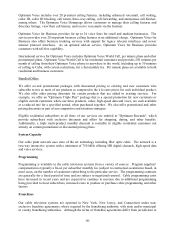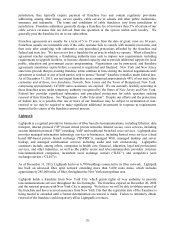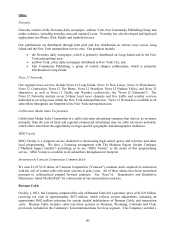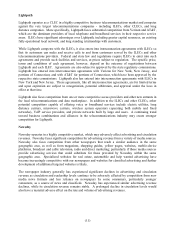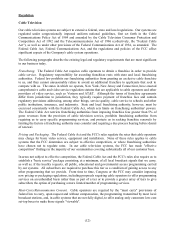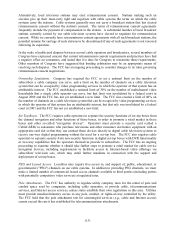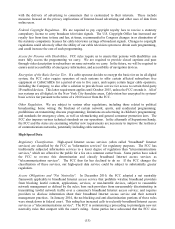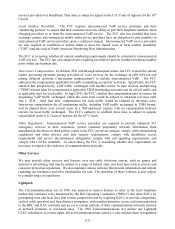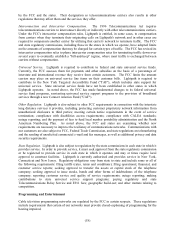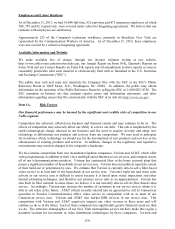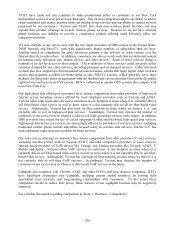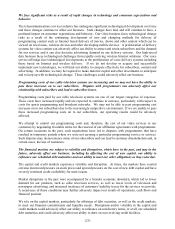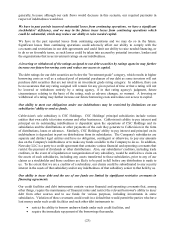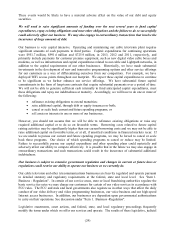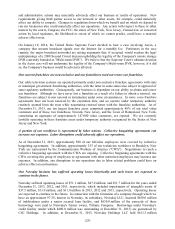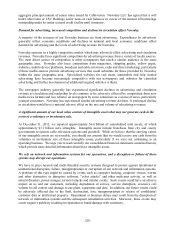Cablevision 2013 Annual Report Download - page 22
Download and view the complete annual report
Please find page 22 of the 2013 Cablevision annual report below. You can navigate through the pages in the report by either clicking on the pages listed below, or by using the keyword search tool below to find specific information within the annual report.(16)
require broadband providers to make transmission capacity available to third parties on a resale basis, but
the FCC thus far has declined to do so.
Access For Persons With Disabilities. FCC rules require us to ensure that persons with disabilities have
access to "advanced communications services" ("ACS"), such as electronic messaging and interoperable
video conferencing. They also require that certain video programming delivered via Internet Protocol
include closed captioning and require entities distributing such programming to end users to pass through
such captions and identify programming that should be captioned.
Other Regulation. Currently, the Federal Cable Act's limitations on our collection and disclosure of cable
subscribers' personally identifiable information also apply with respect to broadband Internet access
service provided by cable operators. In addition, our provision of Internet services also subjects us to the
limitations on use and disclosure of user communications and records contained in the Electronic
Communications Privacy Act. Broadband Internet access service is also subject to other federal and state
privacy laws applicable to electronic communications. As noted above, Congress, the Federal Trade
Commission and other lawmakers and regulators are all considering whether to adopt additional measures
that would govern the collection, use, and disclosure of subscriber information in connection with the
delivery of advertising to consumers that is customized to their interests. Additionally, providers of
broadband Internet access services must comply with the Communications Assistance for Law
Enforcement Act ("CALEA"), which requires providers to make their services and facilities accessible for
law enforcement intercept requests. Various other federal and state laws apply to providers of services
that are accessible through broadband Internet access service, including copyright laws, telemarketing
laws, prohibitions on obscenity, and a ban on unsolicited commercial e-mail, and privacy and data
security laws. Online content we provide is also subject to some of these laws.
Other forms of regulation of high-speed Internet access service currently being considered by the FCC,
Congress or state legislatures include consumer protection requirements; additional privacy and data
security obligations, consumer service standards; requirements to contribute to universal service
programs; and requirements to protect personally identifiable customer data from theft.
VoIP Services
The regulatory obligations of VoIP services are the subject of periodic examination and review by the
FCC, Congress, and state public service commissions. In 2004, for instance, the FCC initiated a generic
rulemaking proceeding concerning the legal and regulatory implications of IP-based services, including
VoIP services. Also in 2004, the FCC determined that VoIP services with certain characteristics are
interstate services subject to federal rather than state jurisdiction and preempted conflicting state laws.
The FCC's determination was upheld by a federal court of appeals, although the court found that the
FCC's order did not squarely address the classification of cable-provided VoIP services. While the FCC
has not concluded its generic rulemaking proceeding, it has applied some regulations to VoIP service
providers that exchange traffic with traditional telephone carriers like Verizon (these services are known
as "interconnected VoIP services"). Some states have asserted the right to regulate cable VoIP service,
while others have adopted laws that bar the state commission from regulating VoIP service.
Universal Service. Interconnected VoIP services must contribute to the federal fund used to subsidize
voice services provided to low income households and rural areas and other communications services
provided to schools, libraries, and rural health care providers (the "universal service fund"). The amount
of universal service contribution for interconnected VoIP service providers is based on a percentage of
revenues earned from end user interstate and international services. We allocate our end user revenues
and remit payments to the universal service fund in accordance with FCC rules. The FCC has ruled that
states may impose state universal service fees on certain types of VoIP providers, which may include
cable VoIP providers. States in which we operate have not imposed universal service fund contributions
for VoIP providers. In October 2011, the FCC adopted an order that fundamentally revised its federal
universal service fund programs to transition support to broadband networks and services, as well as voice


